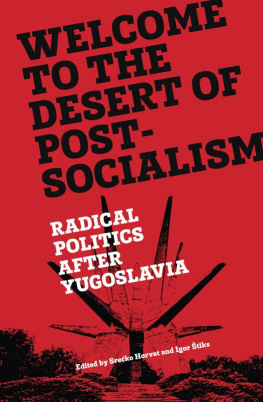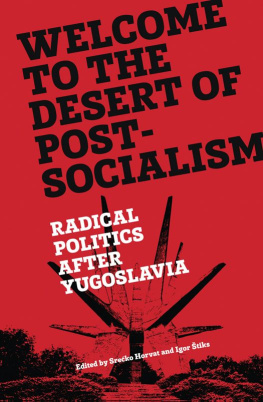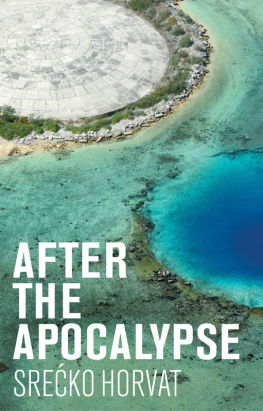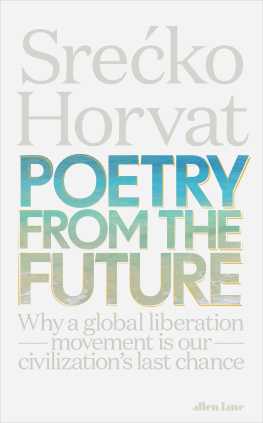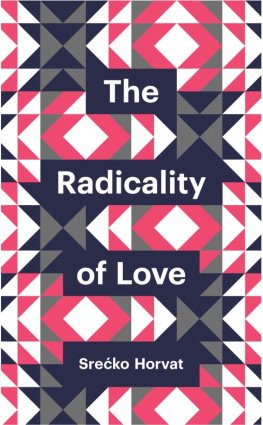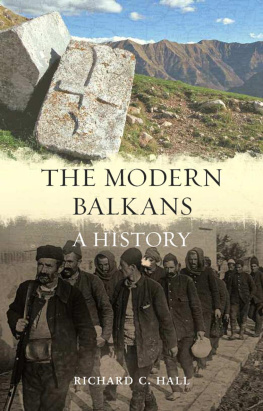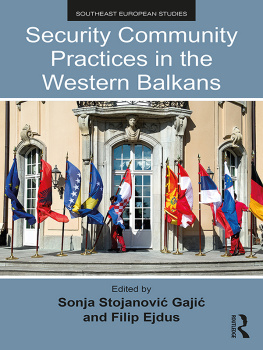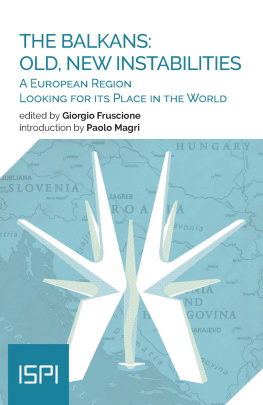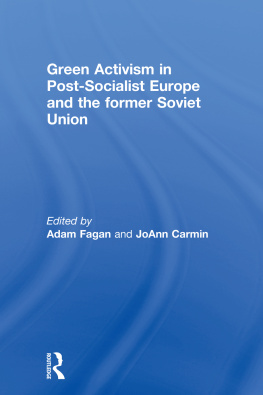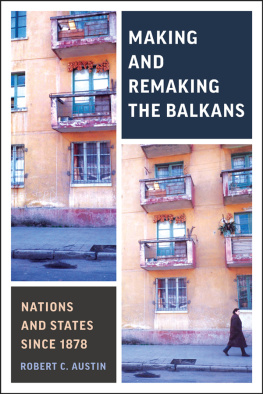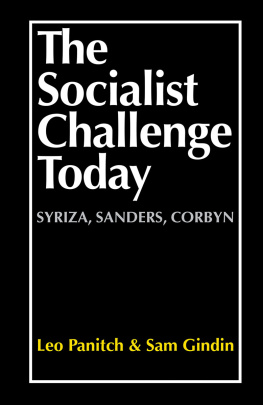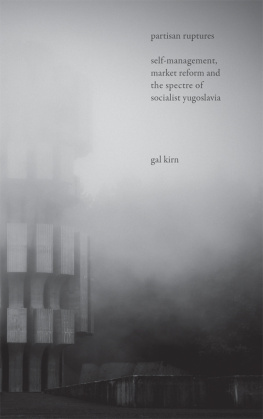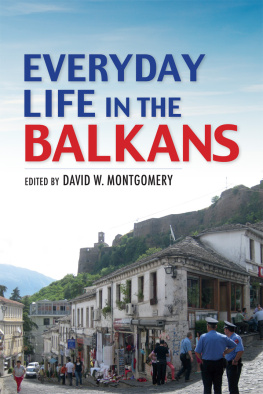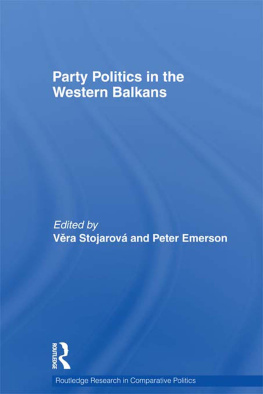First published by Verso 2015
Introduction and Postscript Sreko Horvat and Igor tiks 2015
The collection Verso 2015
Individual contributions Verso 2015
All rights reserved
The moral rights of the authors have been asserted
Verso
UK: 6 Meard Street, London W1F 0EG
US: 20 Jay Street, Suite 1010, Brooklyn, NY 11201
www.versobooks.com
Verso is the imprint of New Left Books
ISBN-13: 978-1-78168-620-1 (PB)
ISBN-13: 978-1-78168-621-8 (HC)
eISBN-13: 978-1-78168-622-5 (US)
eISBN-13: 978-1-78168-737-6 (UK)
British Library Cataloguing in Publication Data
A catalogue record for this book is available from the British Library
Library of Congress Cataloging-in-Publication Data
Welcome to the desert of post-socialism : radical politics after Yugoslavia / edited by Sreko Horvat, Igor tiks.
pages cm
Includes bibliographical references.
ISBN 978-1-78168-620-1 (pbk.)
1. Former Yugoslav republics Politics and government. 2. Post-communism Former Yugoslav republics. 3. Identity politics Former Yugoslav republics. 4. Ethnicity Former Yugoslav republics. 5. Nationalism Former Yugoslav republics. 6. Social conflict Former Yugoslav republics. 7. Former Yugoslav republics Social conditions. 8. Balkan Peninsula Politics and government 1989
I. Horvat, Srecko. II. tiks, Igor, 1977
DR1318.W45 2015
320.9497 dc23
2014034946
v3.1
Contents
Introduction: Radical Politics in the Desert of Transition
Igor tiks and Sreko Horvat
Self-management, Development and Debt: The Rise and Fall of the Yugoslav Experiment
Vladimir Unkovski-Korica
From the Market to the Market: The Debt Economy After Yugoslavia
Andreja ivkovi
Workers and Unions After Yugoslavia
Marko Grdei
Re-imagining the Balkans
Maria Todorova
On the Way to Europe: EU Metaphors and Political Imagination of the Western Balkans
Tanja Petrovi
Children of Post-communism
Boris Buden
The Silence of Lamb-eaters: Transition as a Post-war Crime
Andrej Nikolaidis
Kosovo: The Long Independence Day
Agon Hamza
Mapping Nostalgia for Tito: From Commemoration to Activism
Mitja Velikonja
Insurrections in the Balkans: From Workers and Students to New Political Subjectivities
Michael G. Kraft
They had sex, drugs and rock n roll; well have mini-jobs and loans to pay: Transition, Social Change and Student Movements in the Post-Yugoslav Region
Jana Baevi
Womens Struggles and Political Economy: From Yugoslav Self-management to Neoliberal Austerity
Ankica akardi
Postscript: The Future of Radical Politics in the Balkans Protests, Plenums, Parties
Igor tiks and Sreko Horvat
Acknowledgments
This volume was born out of numerous discussions held at the annual Subversive Festival in Zagreb since 2008. We are particularly indebted to our friend Tariq Ali who encouraged us to prepare a volume providing a fresh critical look at the contemporary Balkans as well as presenting the growing social movements in this region. We are grateful to Verso for accepting our proposal and its editor Sebastian Budgen for his patience and support.
Throughout the process of preparing the volume we were supported by the CITSEE project, based at the Law School of the University of Edinburgh, with which one of us was affiliated. This project dedicated to research on citizenship in the post-Yugoslav region and the wider Balkans provided us both with the time and research resources to complete this volume. Our special thanks go to Jo Shaw, the principal investigator of the CITSEE project, Nick Holdstock, editor of the CITSEE projects web magazine Citizenship in Southeast Europe, who provided valuable editorial and linguistic advice to us and our authors, and, finally, to CITSEEs research assistant Gzim Krasniqi.
The return of radical and emancipatory politics to the post-socialist Balkans is primarily due to the inspiring work of new social and political movements, organisations and engaged individuals. This book is dedicated to them and their struggles.
The editors
July 2013
INTRODUCTION
Radical Politics in the Desert of Transition
Igor tiks and Sreko Horvat
Over the last couple of years we have regularly witnessed popular protests and uprisings in the post-socialist Balkans. The well-known mobilisations, struggles and street violence in the southern part of the peninsula, in Greece and recently Turkey, have a constant and yet under-reported echo in other Balkan states. These have had a different historical trajectory: after the disappearance of the state socialist regimes, in all of these states, most dramatically across the former Yugoslavia, a period of violence, conflict or general instability and economic misery has been followed by a seemingly endless transition to liberal democracy and neoliberal economy. During this process some countries have joined the European Union (Slovenia, Romania, Bulgaria and Croatia), further marginalising the latecomers and laggards in the long process of European integration (Bosnia-Herzegovina, Montenegro, Serbia, Kosovo, Macedonia and Albania), all of which are now encircled by the EU border.
The usual story about the post-socialist Balkans revolves mostly around the following tropes: oscillation between liberalisation and authoritarianism; the complex relationship between the state, organised crime and the economy; corruption; the achievements and shortcomings of the International Tribunal for the Former Yugoslavia; regional cooperation or disputes, successes and failures in the EU accession process.
This story is constantly repeated not only by local and international media but also by scholarship. Up until recently, only rarely did we hear about the devastating consequences of the transition to capitalism, such as general impoverishment, huge public and private indebtedness facilitated by a flow of foreign credit, widespread deindustrialisation, social degradation, depopulation through diminished life expectancy and emigration, and general unemployment (ranging between 20 and 30 per cent and even reaching 50 per cent in countries like Bosnia and Kosovo, especially amongst younger generations). It was no surprise that protests started erupting, movements began to form, and diverse groups and individuals commenced openly to question the post-socialist transition that led to brutal capitalism and diminished democracy. In their efforts to defend the remnants of the socialist state (primarily in education and health), natural and social resources (water, electricity, internet), and jobs (remaining industries, the public sector), they also began to formulate a profoundly anti-capitalist and radically democratic vision of their societies. This is how radical politics was reborn in the rebel peninsula.
Although many of the contributions in this volume refer to other Balkan countries, its focus is on the post-Yugoslav states. The anti-fascist struggle, the rebellion against Stalin, experiments in economic democracy (i.e. socialist self-management), multinational federal composition, and international influence (the Non-Aligned Movement) secured a special place for Yugoslavia (194590), and even a certain prestige, in the general history of socialist movements. Understanding radical politics after Yugoslavia necessarily entails a critical re-evaluation of socialist Yugoslavia, its successes and its failures, as well as of the post-socialist, post-partition and often post-conflict predicament of these societies today.

